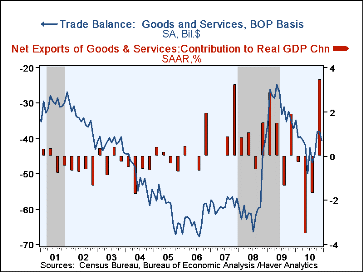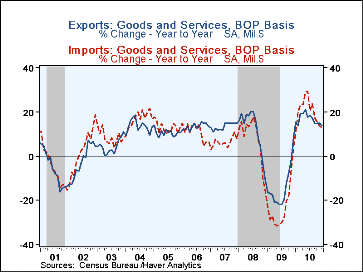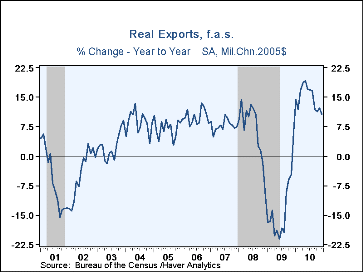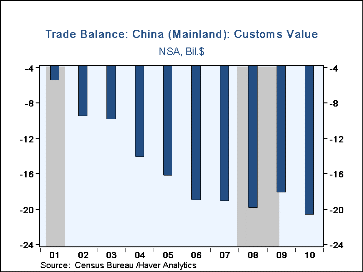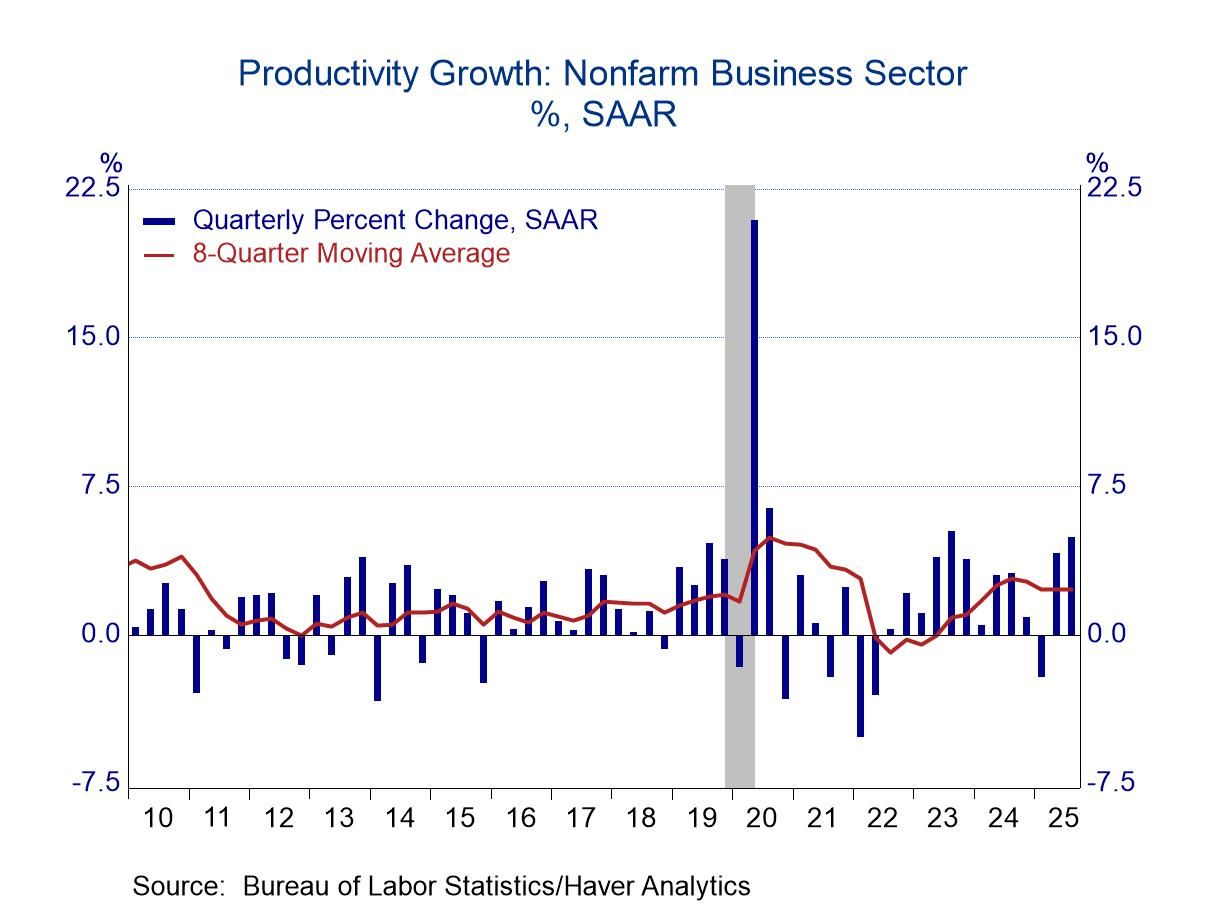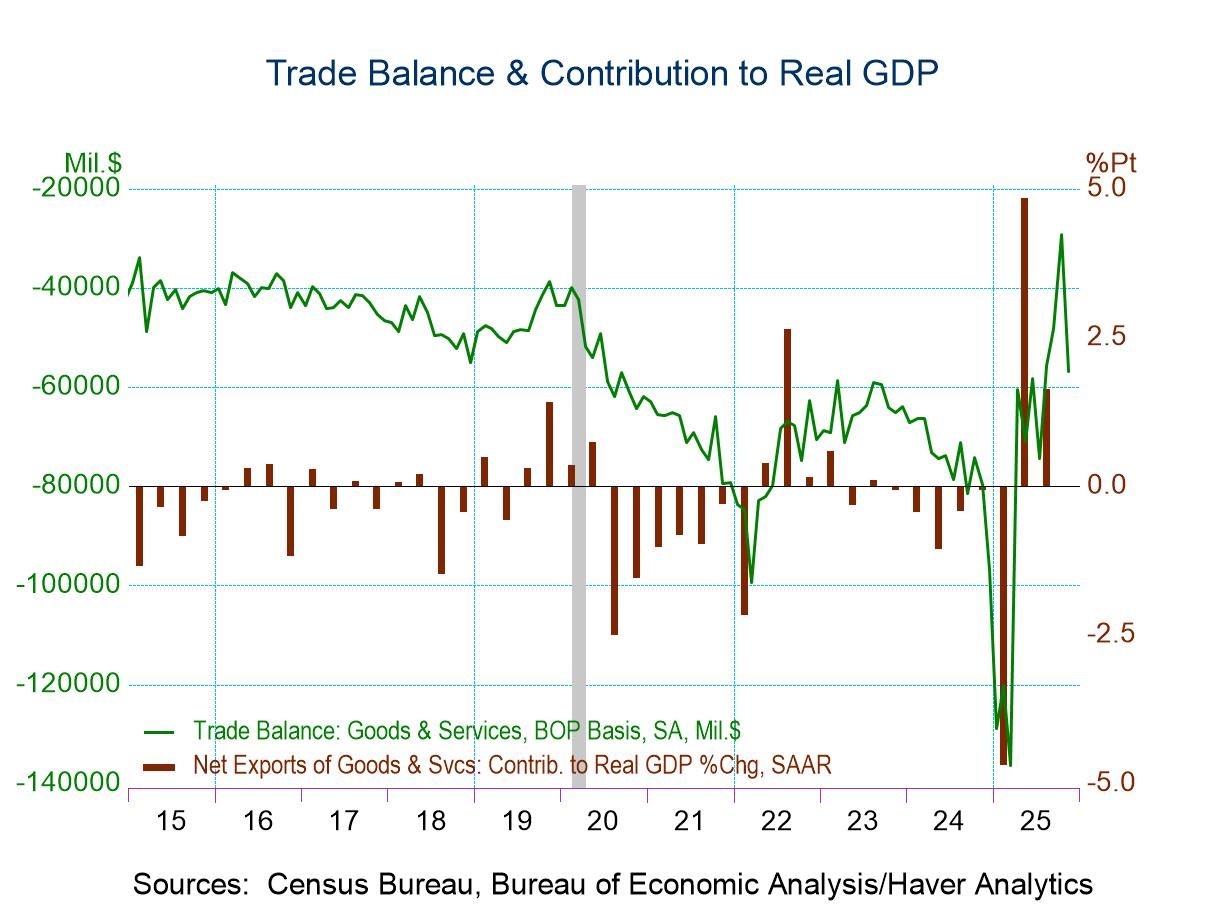 Global| Feb 11 2011
Global| Feb 11 2011U.S. Trade Deficit Deteriorates Due To Higher Oil Prices
by:Tom Moeller
|in:Economy in Brief
Summary
The U.S. foreign trade deficit deepened during December to $40.6B versus a little-revised $38.3B in November $38.3B. Consensus expectations had been for $40.0B. For the full year, the deficit deepened to $497.8B. Exports gained 1.8% [...]
The U.S. foreign trade deficit deepened during December to $40.6B versus a little-revised $38.3B in November $38.3B. Consensus expectations had been for $40.0B. For the full year, the deficit deepened to $497.8B. Exports gained 1.8% in December (13.7% y/y) following the 1.0% November increase. Imports rose 2.6% (12.8% y/y) with the rise in oil prices. In chained 2005 dollars, the deficit in goods deteriorated to $555.3B for the full-year from $486.6B as exports rose 14.7% and imports rose 14.5% y/y.
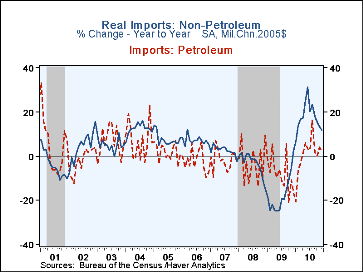 Nominal exports of autos & parts were strongest last month posting a 6.2%
rise (9.9% y/y) followed by nonauto capital goods with a 3.8% increase (13.0%
y/y). Nonauto consumer goods exports fell 2.0% (+11.2% y/y) while exports of
foods, feeds & beverages slipped 0.4% (+18.5% y/y). Nominal imports of goods
jumped another 3.1% as higher prices lifted oil imports by 16.8% (18.0% y/y).
The per barrel cost of imported crude oil was $79.78 versus $76.81 in November.
Imports of "other" goods also were firm posting a 6.6% gain (6.3%
y/y). Foods, feed & beverages imports were strong with a 2.4% increase
(16.1% y/y). Elsewhere there was m/m weakness. Capital goods imports fell 1.2%
but they rose 17.6% during the past 12 months. Imports of nonauto consumer goods
imports also fell 1.0% but were up 10.0% y/y with the improving U.S. economy.
Nominal exports of autos & parts were strongest last month posting a 6.2%
rise (9.9% y/y) followed by nonauto capital goods with a 3.8% increase (13.0%
y/y). Nonauto consumer goods exports fell 2.0% (+11.2% y/y) while exports of
foods, feeds & beverages slipped 0.4% (+18.5% y/y). Nominal imports of goods
jumped another 3.1% as higher prices lifted oil imports by 16.8% (18.0% y/y).
The per barrel cost of imported crude oil was $79.78 versus $76.81 in November.
Imports of "other" goods also were firm posting a 6.6% gain (6.3%
y/y). Foods, feed & beverages imports were strong with a 2.4% increase
(16.1% y/y). Elsewhere there was m/m weakness. Capital goods imports fell 1.2%
but they rose 17.6% during the past 12 months. Imports of nonauto consumer goods
imports also fell 1.0% but were up 10.0% y/y with the improving U.S. economy.
Services exports were essentially unchanged (+6.1% y/y) but travel exports fell 1.3% (+10.0% y/y). Passenger fares also fell but were up 21.9% from last December. Imports of services also slipped marginally (+5.2% y/y). Travel imports fell slipped m/m (+4.1% y/y) and passenger fares also slipped (+8.2% y/y).
By country and for the full year, the goods trade deficit with China deteriorated to $273.1B as exports rose one-third but imports rose by a lesser one-quarter. (In dollar terms, U.S. imports from China are roughly four times exports.) The trade deficit with Japan also deteriorated to $59.8B as exports rose 18.4% and imports rose 25.6%. (Again, imports from Japan are roughly twice the level of U.S. exports.) The trade deficit with the European Union deteriorated to $8.0B as U.S. exports grew 8.7% y/y and imports rose 13.4%. (Imports from Europe are one-third larger than U.S. exports.)
The international trade data can be found in Haver's USECON database. Detailed figures are available in the USINT database.
Uncertainty Lies Ahead For The World Economy from the Federal Reserve Bank of Atlanta can be found here
| Foreign Trade | Dec | Nov | Oct | Y/Y | 2010 | 2009 | 2008 |
|---|---|---|---|---|---|---|---|
| U.S. Trade Deficit | $40.6B | $38.3B | $38.3B | $37.1B (12/09) |
$497.8B | $374.9B | $698.8B |
| Exports-Goods & Services (m/m) | 1.8% | 1.0% | 3.0% | 13.7% | 16.6% | -14.6% | 11.5% |
| Imports-Goods & Services | 2.6 | 0.8 | -0.8 | 12.8 | 19.7 | -23.3 | 8.0 |
| Petroleum | 16.8 | 6.9 | -7.4 | 13.0 | 32.4 | -44.0 | 37.0 |
| Nonpetroleum | 0.3 | 0.0 | 0.2 | 14.4 | 20.7 | -20.9 | 1.5 |
Tom Moeller
AuthorMore in Author Profile »Prior to joining Haver Analytics in 2000, Mr. Moeller worked as the Economist at Chancellor Capital Management from 1985 to 1999. There, he developed comprehensive economic forecasts and interpreted economic data for equity and fixed income portfolio managers. Also at Chancellor, Mr. Moeller worked as an equity analyst and was responsible for researching and rating companies in the economically sensitive automobile and housing industries for investment in Chancellor’s equity portfolio. Prior to joining Chancellor, Mr. Moeller was an Economist at Citibank from 1979 to 1984. He also analyzed pricing behavior in the metals industry for the Council on Wage and Price Stability in Washington, D.C. In 1999, Mr. Moeller received the award for most accurate forecast from the Forecasters' Club of New York. From 1990 to 1992 he was President of the New York Association for Business Economists. Mr. Moeller earned an M.B.A. in Finance from Fordham University, where he graduated in 1987. He holds a Bachelor of Arts in Economics from George Washington University.


